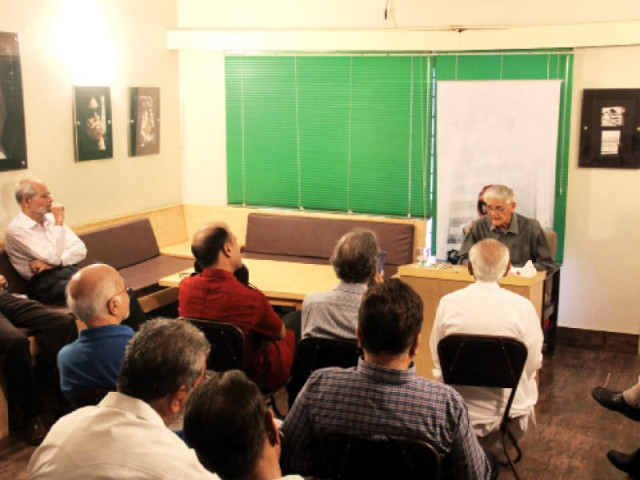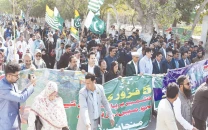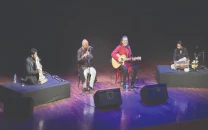Down memory lane: The last survivor of the Rawalpindi conspiracy recalls the events and imprisonment
Zafarullah Poshni was reading from his book Zindagi Zindan Dili Ka Naam Hai.

The lively-spirited lone survivor of the Rawalpindi conspiracy case, Zafarullah Poshni, read his book ‘Zindagi Zindan Dili Ka Naam’ at the Readers Club on Friday. PHOTO: AYESHA MIR/EXPRESS
Around 20 neatly dressed men of middle and old age sat silently listening to the 88-year-old Zafarullah Poshni — the lone survivor of the Rawalpindi conspiracy case - who was reading out a paragraph from his book, Zindagi Zindan Dili Ka Naam Hai.
It was a meeting at the Readers Club on Friday evening with Poshni about his book and he was methodically describing the personalities of everyone accused in the conspiracy, narrating events from his life in jail with a tinge of humour in his speech and the audience responded to every sentence.
The book describes in detail the four years that Poshni spent in jail with the military officers and civilians who were accused and then convicted for hatching a conspiracy against the civilian government of former prime minister Liaquat Ali Khan in 1951.
Poshni was convicted in the case and spent four years in the Hyderabad central jail along with Urdu poet Faiz Ahmed Faiz and eminent writer and the then Communist Party of Pakistan general secretary, Syed Sajjad Zaheer; also among the 15 accused of the conspiracy.
Poshni, who was a captain in the Pakistan Army, says that he was in the platoon of the then Major Ishaq Muhammad and was introduced to then Major-General Akbar Khan by Major Ishaq.General Khan was behind the planning of the conspiracy, which according to Poshni was ultimately rejected in a meeting held at Major Khan’s residence on February 22, 1951, at Rawalpindi. That meeting was later termed the ‘Rawalpindi Conspiracy’.
“The communist party was under tremendous pressure from Liaquat Ali’s government and it was not allowed to operate openly,” he claimed. “Its leaders’ arrest warrants were issued and some of them were forced to go underground.”
Poshni said that General Khan’s wife, Begum Nasim Akbar, brought Faiz and Zaheer into the plan. “The conspiracy and the Communist Party of Pakistan had no association with the Soviet Union,” he said, negating the general notion that exists in the case history.
“Around 60 years have passed but I can still remember the pressure of those days,” he said. “The trial began on June 15, 1951, at 8am. A K Brohi was heading the prosecution and Huseyn Shaheed Suhrawardy headed the defence.” He then described the characters of the two lawyers; the former as a meticulous man who come to the court fully prepared for his case and the latter as a brilliant man who would go through the witnesses’ statements for 10 minutes and then would continue his cross-question for hours.
Poshni was of the opinion that if the conspiracy had managed to successfully overthrow the government, the communist party and the leftists would still not have been able to rule the country because of the differences in ideologies and thinking of the people accused in the case. “Major Ishaq was a hot-tempered man who would even exchange hot words with the tribunal judges. Zaheer and Faiz sahab were cool and polite. Zaheer would always dress neatly and I hesitate about speaking on Faiz. He would speak little and often smoked in silence. He would use perfumes and would say ‘Khushbu sunnat hai and I am a part of the Islamic civilisation’,” he said, underlining the differing natures of the conspirators.
In his book, Poshni compared their time in jail to that of women that are not allowed outside their houses and resorted to petty squabbles to fight their boredom. “We would squabble and would insult one another behind their backs,” he said. “If you imprison all the intellectuals of the world together for six month, they would start squabbling like petty women over domestic disputes,” he said, reading a paragraph from the book.
Published in The Express Tribune, May 25th, 2014.



















COMMENTS
Comments are moderated and generally will be posted if they are on-topic and not abusive.
For more information, please see our Comments FAQ